Both Andre Burakovsky and Cale Makar were out of the lineup for Colorado on Wednesday night. The team seems to think Makar is closer to returning than Burakovsky is. On the bright side (I think?), Gabriel Landeskog was able to play with a broken nose. I know a lot of teams are going through injuries, but it would be really nice to see this full lineup be completely healthy by the time playoffs roll around.
Mikko Rantanen was also skating, though in a non-contact jersey, so he'll need a lot more time.
*
After what could have been a gruesome skate-cut injury, Johnny Boychuk was at Islanders practice on Wednesday. He wasn't partaking in practice, obviously, but the fact that he's released and with the team is a very good sign, and a big relief for not only himself, family, and team, but the hockey community at large. That was a scary, scary incident.
*
A memo for cap league owners: the NHL expects the salary cap to be somewhere in the $84-$88M range next year. To be safe, expecting that to be on the lower end is probably a good idea. Better to have extra cap space that you don't immediately need to use than too little.
*
James van Riemsdyk suffered an injured hand during their game against Washington on Wednesday night, and coach Alain Vigneault did not seem optimistic about the x-rays that were done. Seems likely that Joel Farabee should be on his way back to the team if JvR misses any games, which also seems likely.
*
The Flyers took that game 5-2 and it was a game that looked like a three-goal margin. We had very good efforts from Kevin Hayes (1+1 with five shots and two PIMs) and Ivan Provorov (1+1 with two shots and two blocks). Not that it was a good night at the office for the Caps as a whole, but Braden Holtby's save percentage is now well under .900.
*
I had been wondering why Alex DeBrincat was having a down season this year. After scoring 28 in his rookie season, and 41 in his sophomore campaign, he might struggle to get to 20 goals this year. I saw his low all-situations shooting percentage and decide to look deeper. It didn't take long to diagnose the problem: out of 219 forwards with at least 700 minutes played at 5-on-5 this year, DeBrincat is 216th in shooting percentage at 3.76 percent. For reference, that's lower than Milan Lucic at 3.77 percent. I suppose I didn't need to add context to show that being 216th out of 219 players in shooting percentage is bad, but when you see it's lower than Lucic, it really hits home.
The funny thing is his individual expected goals rate (0.69) isn't far off from last year (0.68) or his rookie year (0.71). It's not from a lack of playing with Patrick Kane, as DeBrincat played 18.3 percent of his 5-on-5 ice time with Kane over his first two years compared to 44.7 percent this year. Judging by his expected goals rates, it's not as if he's shooting from wildly different spots. In fact, here's his shot heat map at 5-on-5 from his first two seasons (from Hockey Viz):
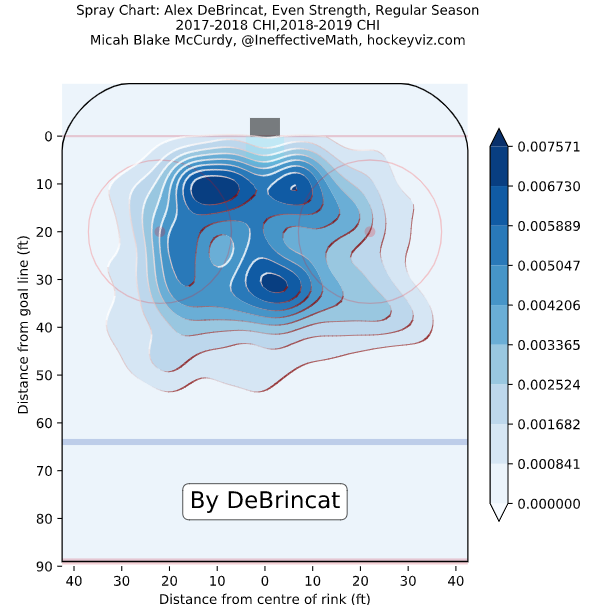
And here is his shot map from this year:
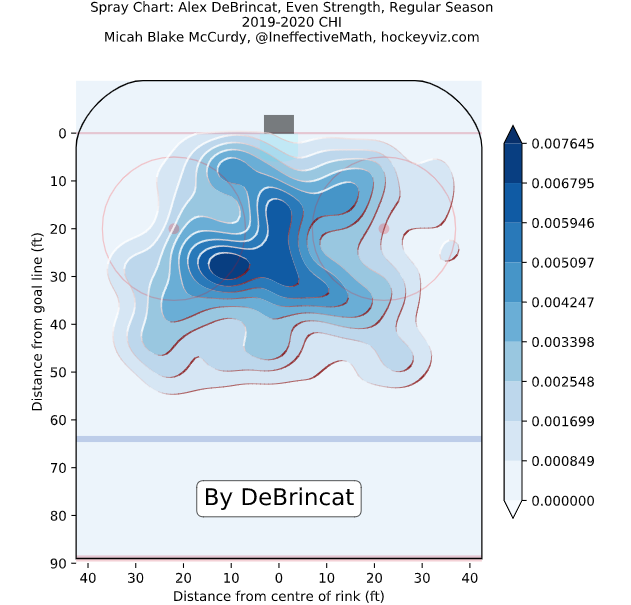
Of course, there are differences, but we see the bulk of his shots are coming from below the circles and somewhere in the slot area. That's what we like to see.
There may be something sinister under the hood here but on the surface, it seems to be a bit of bad luck. I'm not sure he can repeat his high shooting percentages from his first two seasons, but he's a talented shooter playing with talented players. He's too good to shoot under four percent continually.
I'm not sure there's a buy-low opportunity for DeBrincat because his owners will still have that 40-goal season fresh in mind. All the same, I think his acquisition price is lower now than it will be a year from now. No need to sell the farm in a trade, but it's likely worth inquiring what he might cost, especially for those out of the H2H playoff picture who need players for next year (assuming your deadline hasn't passed).
*
One guy I was hoping would take another step forward this year was St. Louis defenceman Vince Dunn. Before the season, my reasoning was the team was pretty loaded on the right side – Pietrangelo, Parayko, Faulk – but fairly light on the left – basically just Bouwmeester and Gunnarsson. The thinking was that Bouwmeester was on the decline and Gunnarsson wasn't a huge impediment. If Dunn could play to the level I thought he was capable, then playing over 20 minutes a night was well within reach. With their depth up front and his puck-moving talent, I was very much hoping he could get to the 40-point mark this year, providing good value at the draft table.
That hasn't worked out. So, why?
For one, the guys ahead of him didn't see ice-time declines: up until Bouwmeeter's unfortunate incident nearly a month ago, Dunn was a distant fifth place in 5-on-5 TOI among their blue liners, with the three aforementioned right-handers all at least three minutes ahead of him apiece. It's one of those situations where the coach hasn't stuck to L/R pairings at all times, but rather ensured that his three best defencemen are among the top-2 pairs in terms of ice time. It's not something every coach does, but of course it makes sense. It's just unfortunate that it has to be at the expense of Dunn's TOI.
The second reason is the lack of PPTOI. Over his first two season, Dunn averaged over two minutes of 5-on-4 PPTOI per game, with just 43 seconds separating him from Alex Pietrangelo. That has changed drastically this year as Dunn is averaging just 1:28 per game at 5-on-4, with Pietrangelo nearly double that at 2:55. Again, as a coach, it makes a lot of sense, but it's just unfortunate for Dunn.
Here's one thing I wonder: how much did the injury to Vladimir Tarasenko change Dunn's fortunes for this year? The reason I say that is through the team's first 10 games this season, when Tarasenko was still healthy, Dunn was leading the team in 5-on-4 ice time per game, garnering more ice time than even Pietrangelo. Back at that point of the season, the team was running basically two even power-play units, with Faulk garnering the least 5-on-4 TOI per game at 2:13 and Dunn the most at 2:35. They had nine players basically within 20 seconds of each other. It was a true split.
After the Tarasenko injury, however, the strategy changed, and the team went to a fairly consistent top PP unit: there have been five guys (Pietrangelo, Schenn, Schwartz, O'Reilly, Perron) all with at least 2:44 per game, and the next-closest after those five is Tyler Bozak at 1:26.
Again, I ask: how much did Tarasenko's injury change Dunn's fortunes this year? Because it could go beyond just PPTOI. Consider that from Christmas 2018, or about a month after Berube was hired as coach last season, through to Tarasenko's injury in late October 2019, the Blues were eighth in the league in shot attempts generated per 60 minutes, and fifth by expected goals for. That was a span of 58 games. Since the Tank shoulder issue cropped up on October 24th, a span of 57 games, the Blues are 29th by shot attempts generated and 22nd by expected goals for. I don't think we can say for sure unless Berube comes out and tells us for sure in some press conference, but it sure seems like as if there was a team-wide change in their strategies once they lost their most dynamic offensive player. If that's true, not only did the injury cost Dunn a lot of PPTOI, did it cost him 5-on-5 points as well? Their actual goal scoring has been fairly consistent with and without Tarasenko, so maybe not? All the same, it fundamentally changed the way this team plays hockey, it's hard not to think there wasn't some effect on Dunn.
More than anything there's the individual points percentage. Last year, he had a point on over 49 percent of the team's goals at 5-on-5; this year, that number cratered to 24 percent. If he repeats that 49 percent this year, he's sitting with 34 points on the season, and close to the 40 points I was hoping for.
Is hoping for a 49 percent IPP from a defenceman asking a lot? Yeah, it is. Over the last two years, the only regular defenceman over 49 percent is Roman Josi (50.7), with only six other defencemen over 45 percent. Somewhere around 40 percent is realistic for a good puck-mover (which I think Dunn is), and at 40 percent, he'd be at 30 points this year while playing 16 minutes a night. That would be a very good mark with 20 percent of the season remaining.
I still have a lot of hope here. I hate how this sounds, but it sure seems like Bouwmeester could head to retirement given his recent health troubles and the fact that he's UFA. Also, with Alex Pietrangelo commanding a large contract that would put the team near the cap, it seems unlikely they re-sign the recently acquired Marco Scandella. There's a world where Dunn is the LD1 next year for this team, or at worst LD2, getting secondary PP minutes. That would be a massive boon to his fantasy value.
There's no reason to give up on Dunn for 2020-21. I'll do a deeper dive sometime this summer once we have a better idea of his transition measures for this year, but let's remember he's a 23-year old defenceman with fewer than three seasons under his belt on a veteran-laden team looking for a second Stanley Cup. We need to be patient.

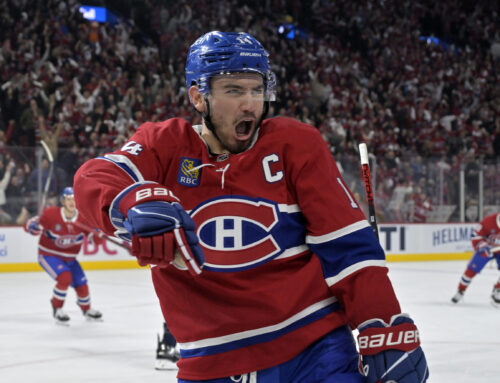
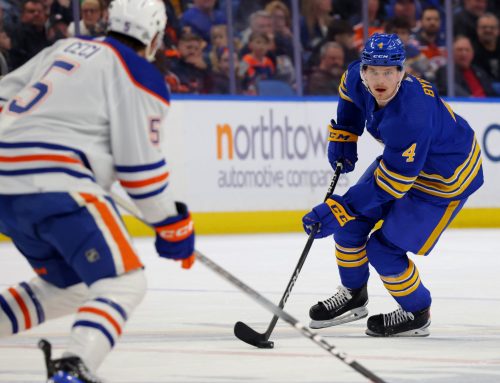
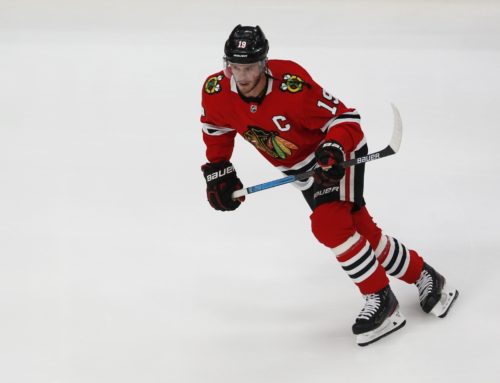
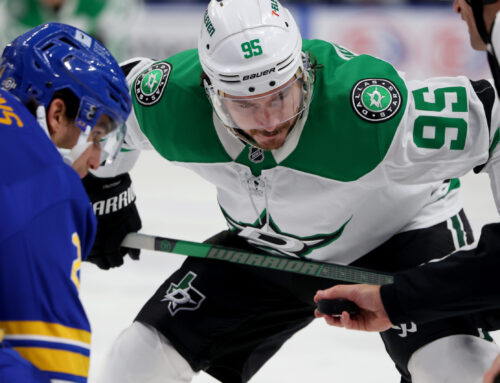
 BUF
BUF NYR
NYR CHI
CHI MIN
MIN CBJ
CBJ VAN
VAN S.J
S.J PIT
PIT ANA
ANA
